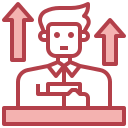Mindset, Confidence, and Renewal
Write the loudest fears—“too late,” “too risky,” “not technical enough.” Counter each with evidence from your wins. Perspective grows where proof lives, and your history contains plenty of it.
Mindset, Confidence, and Renewal
Track three wins: a conversation, a draft portfolio piece, a concept learned. Small, repeated victories rewire belief, keep momentum, and make bigger leaps feel surprisingly doable over time.




